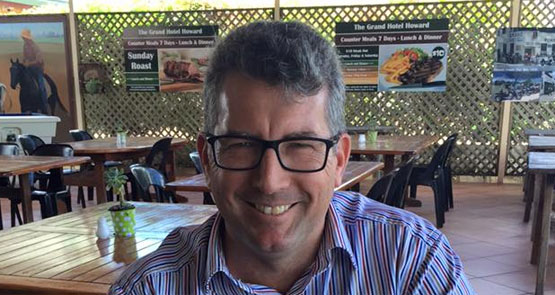
Hinkler MP Keith Pitt
One of the most persistent complaints in recent decades by National Party politicians is about the diminishing media presence in their electorates. Even as aggregation brought more television services to regional communities, commercial radio licence expansion significantly increased the number of radio stations available, pay TV rolled out and the internet became available (despite the best efforts of the Liberal-privatised Telstra), National MPs were complaining that regional communities were being denied access to proper media services.
Back in 2000, the MP regarded within National ranks as an “authority” on regional media, Queensland MP Paul Neville, was allowed to launch a parliamentary inquiry into local radio services amid complaints commercial radio networks were networking too much local content. And in 2006, Neville was allowed to dictate parts of the 2006 media ownership reforms addressing regional content.
Now, with regional TV operators urging that they be allowed to merge with metro stations, the Nationals are again pushing their obsession with local content, floating the idea of imposing local content requirements on television broadcasters in exchange for supporting a removal of the 75% reach rule — the rule that prevents regional and metro broadcasters from merging. There’s even talk of going beyond local content requirements to a “local presence” requirement that would dictate to television broadcasters how many journalists and producers, and what supporting infrastructure, they would have to have in regional areas.
Appropriately, the push is being led by Keith Pitt, the otherwise obscure Nationals MP who succeeded Neville in the seat of Hinkler.
The problem is, there are already local content requirements in place for regional broadcasters. They were established by the then-Australian Broadcasting Authority in 2004 after inquiries into the closure of TV newsrooms in a number of regional centres by Southern Cross. In 2006 the requirements were given legislative backing and extended from Queensland, NSW and Victoria to Tasmania. The requirements are based on a points system that gives some freedom to broadcasters about how they provide local news and content, while requiring a minimum amount.
But are regional communities crying out for more local content? Actually, no. At the instigation of the former government, in 2013 ACMA launched an exhaustive investigation of the issue, replete with public and industry consultation, case studies, polling by Newspoll and economic analysis. The polling found 91% of people in regional communities were satisfied with access to local content — and there didn’t seem to be much difference between areas with local content requirements and those without. Local newspapers were an important source for community news and information — relied on more heavily than local TV or radio — while regional communities relied on the internet for weather information.
So why are the Nationals so obsessed with local news services? Vanity. They know that less local television and radio news means fewer microphones and cameras at their media stops and less likelihood they’ll appear on local screens and radios. It’s all about them, not their voters.
Plainly the Nationals want a repeat of the 2006 media reforms undertaken by the Howard government, when, to ensure then-maverick Barnaby Joyce and Ron Boswell didn’t cross the floor in the Senate and derail the media ownership reform package, the Nationals were allowed to virtually dictate local content rules to be imposed on regional radio broadcasters. Neville was initially keen on local presence requirements as well, but was talked around to the idea of “Local Content Plans” by which broadcasters had to lodge with ACMA plans that showed how they would meet local content requirements. But the detailed content rules dictated by Neville — described as “draconian” by the industry — were so onerous on radio broadcasters that in 2011, Labor’s Stephen Conroy had to introduce amendments to reduce their impact (so much for the Liberals being the party of small government).
If the Nationals are thwarted in imposing further “draconian” requirements on commercial broadcasters, their next alternative is the ABC: they are considering a radical intervention in the independence of the ABC to force the national broadcaster to provide mandated levels of local television news. In 2001, then-ABC MD Jonathan Shier cannily exploited the issue of local content to secure some much-needed extra funding for ABC Local Radio services. But this time funding would be “re-allocated” within the ABC to more regional content, according to one MP. Needless to say, no Nationals MPs spoke up when Malcolm Turnbull slashed over $250 million from the ABC’s budget in 2014. They have the same magic pudding understanding of broadcasting budgets as they do of the Commonwealth budget.
If it wanted to support local content in regional communities, a truly Liberal government — like the one Malcolm Turnbull promised on the night he became Prime Minister — would put regional content services to tender and let broadcasters bid for funding to produce content. Alternatively, it could establish a tradable content obligation that would allow the broadcaster with the most efficient operations to provide services. Both mechanisms were suggested by ACMA in its 2013 review. Neither, of course, fit the “intervene first, ask questions later” mindset of the Nationals.








‘ it could establish a tradable content obligation that would allow the broadcaster with the most efficient operations to provide services.’
Never mind the quality, feel the width!
I don’t know why their is such an objection to making regional broadcasters providing decent local programs. I am not a National party supporter but I can see why they want a better deal. Local radio and tv programming is in decline. Even in the ACT only one commercial network provides a 30 minute news service. Surely the others could do some local program, it does not have to be news but could be sport, current affairs or even music.
I don’t know why their is such an objection to making regional broadcasters providing decent local programs.
Because socialism !
If the regional people really wanted local content, they’d be able to afford to pay for it !